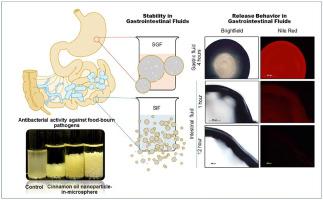当前位置:
X-MOL 学术
›
J. Food Eng.
›
论文详情
Our official English website, www.x-mol.net, welcomes your feedback! (Note: you will need to create a separate account there.)
Nano/microstructured hybrid composite particles containing cinnamon oil as an antibiotic alternative against food-borne pathogens
Journal of Food Engineering ( IF 5.5 ) Pub Date : 2021-02-01 , DOI: 10.1016/j.jfoodeng.2020.110209 Jakarwan Yostawonkul , Naiyaphat Nittayasut , Atitaya Phasuk , Rachatapan Junchay , Suwimon Boonrungsiman , Sasithon Temisak , Mesayamas Kongsema , Waranyoo Phoolcharoen , Teerapong Yata
Journal of Food Engineering ( IF 5.5 ) Pub Date : 2021-02-01 , DOI: 10.1016/j.jfoodeng.2020.110209 Jakarwan Yostawonkul , Naiyaphat Nittayasut , Atitaya Phasuk , Rachatapan Junchay , Suwimon Boonrungsiman , Sasithon Temisak , Mesayamas Kongsema , Waranyoo Phoolcharoen , Teerapong Yata

|
Abstract Essential oils (EOs) from various aromatic herbs exhibit potent in vitro antimicrobial characteristics against several bacterial foodborne pathogens and have therefore been proposed as natural alternatives to antibiotic agents. However, oral administration of EOs has limited practicality because of their high volatility, odor, rapid decomposition, and poor bioavailability in the lower part of the intestines. The main objective of the present study was to develop and evaluate an innovative tool for targeted delivery and sustained release of EOs in the gastrointestinal tract by using a nano/microstructured hybrid composite system. Cinnamon oil was used as a plant-derived antimicrobial agent model to prepare the nanoparticles via the hot homogenization technique. The prepared nanoparticles were then encapsulated in microparticles using an alginate-calcium chloride system. Their stability was investigated in simulated gastrointestinal fluid. The particles were also physicochemically characterized and biologically evaluated as antibacterial agents against foodborne pathogens. Our results showed that under simulated gastrointestinal conditions, the nano/microstructured hybrid composite particles exhibited good gastric resistance and sustained release in intestinal fluids. They also exhibited excellent antibacterial characteristics against important foodborne pathogens, namely, Escherichia coli O157:H7, Pseudomonas aeruginosa, Salmonella typhi, S. enterica, Staphylococcus aureus, and Vibrio cholerae. In conclusion, the innovation reported in the present study is an improved formula of cinnamon oil that could serve as a promising candidate as an antibacterial bioproduct for decontamination of foodborne pathogens in the gastrointestinal tract.
中文翻译:

含有肉桂油的纳米/微结构混合复合颗粒作为抗食源性病原体的抗生素替代品
摘要 来自各种芳香草本植物的精油 (EO) 对几种细菌性食源性病原体表现出有效的体外抗菌特性,因此被提议作为抗生素的天然替代品。然而,口服EOs具有挥发性高、气味难闻、分解快、肠道下部生物利用度差等问题,实用性有限。本研究的主要目的是开发和评估一种创新工具,通过使用纳米/微结构混合复合系统在胃肠道中靶向递送和持续释放 EO。肉桂油被用作植物来源的抗菌剂模型,通过热均质技术制备纳米颗粒。然后使用藻酸盐-氯化钙系统将制备的纳米颗粒封装在微粒中。在模拟胃肠液中研究了它们的稳定性。还对这些颗粒进行了物理化学表征和生物学评估,作为针对食源性病原体的抗菌剂。我们的结果表明,在模拟胃肠道条件下,纳米/微结构杂化复合颗粒表现出良好的胃耐受性和在肠液中的缓释作用。它们还对重要的食源性病原体表现出优异的抗菌特性,即大肠杆菌 O157:H7、铜绿假单胞菌、伤寒沙门氏菌、肠炎沙门氏菌、金黄色葡萄球菌和霍乱弧菌。综上所述,
更新日期:2021-02-01
中文翻译:

含有肉桂油的纳米/微结构混合复合颗粒作为抗食源性病原体的抗生素替代品
摘要 来自各种芳香草本植物的精油 (EO) 对几种细菌性食源性病原体表现出有效的体外抗菌特性,因此被提议作为抗生素的天然替代品。然而,口服EOs具有挥发性高、气味难闻、分解快、肠道下部生物利用度差等问题,实用性有限。本研究的主要目的是开发和评估一种创新工具,通过使用纳米/微结构混合复合系统在胃肠道中靶向递送和持续释放 EO。肉桂油被用作植物来源的抗菌剂模型,通过热均质技术制备纳米颗粒。然后使用藻酸盐-氯化钙系统将制备的纳米颗粒封装在微粒中。在模拟胃肠液中研究了它们的稳定性。还对这些颗粒进行了物理化学表征和生物学评估,作为针对食源性病原体的抗菌剂。我们的结果表明,在模拟胃肠道条件下,纳米/微结构杂化复合颗粒表现出良好的胃耐受性和在肠液中的缓释作用。它们还对重要的食源性病原体表现出优异的抗菌特性,即大肠杆菌 O157:H7、铜绿假单胞菌、伤寒沙门氏菌、肠炎沙门氏菌、金黄色葡萄球菌和霍乱弧菌。综上所述,



























 京公网安备 11010802027423号
京公网安备 11010802027423号